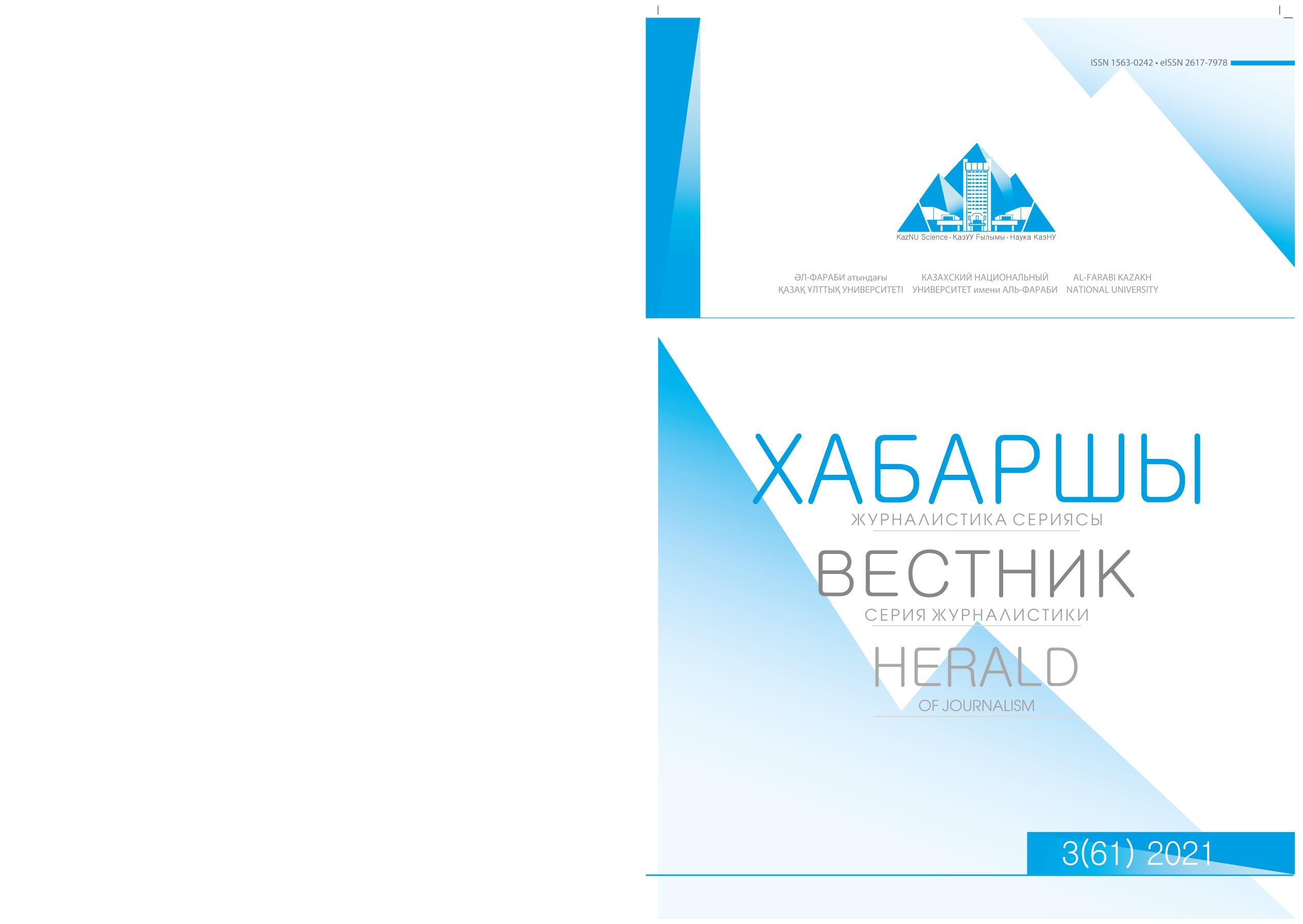Publicisticdiscourseand social and communicative relations
DOI:
https://doi.org/10.26577/HJ.2021.v61.i3.03Abstract
The article deals with the application of the theory of interdisciplinary discourse, the function of publicistic discourse, the definition of discourse, communication issues in the socio-cultural context.The use of the term «discour» in a comprehensive study of the concept of linguistic communication from a new point of view leads to breakthroughs in modern science. Discourse, which is one of the new levels of research, is viewed as a broad and complex structure. In this regard, a study of publicistic discourse is carried out, taking into account its signs and nature of use.
Attention is drawn to the need for theoretical and practical consideration of publicisticdiscourse in various forms – television discourse, newspaper discourse.The purpose of this article is to show the importance of methods for realizing the relationship between addressee and addressee in a new paradigmatic model, establishing interaction with society in publicistic discourse. The sequential use of both professional and ethnic factors in the organization of institutional discourse is described.
The study provides classifications of categories of publicistic discourse, characterizes the place of publicistic discourse in the communicative space, describes the advantages and disadvantages of television and newspaper discourse in the space of social and communicative relations.
The methodological basis of publicistic discourse is the realization of the idea of pride in the country. The author considers it important to form a patriotic spirit through successful communication with the addressee through the use of communication strategies and tactics. The need for research within the framework of publicistic discourse in order to form linguistic consciousness, background knowledge about the environment based on human factors is emphasized.
The article will be of interest to scholars engaged in discursive research.
Keywords: discourse, journalistic discourse, social-communicative relations, TV-radio discourse, newspaper discourse
References
Егорова С. А. Спортивный газетно-публицистический дискурс: коммуникативные
стратегии и тактики / диссертация на соискание ученой степени кандидата филологический наук. – Страврополь, 2021. – 161 с.
Johan N. Linguistic diversity in space and time.– Chicago: University of Chicago Press,1992.
– 352 p.
Кубрякова Е. С. Краткий словарь когнитивных терминов. – Москва,1997. – 245с.
Кондратьев Э.В., Абрамов Р.Н. Связи с общественностью. – Москва: Академический проект, 2005. – 432 с.
Қанабекова М. Қазақ тілінің стилистикалық негіздері. –Алматы: Қыздар университеті, 2013. – 203 б.
Ларина Е. Г. Лингвопрагматические особенности ток-шоу как жанра телевизионного дискурса: на материале американских телевизионных программ. – Москва, 2004. – 171с.
Langacker R.W. Cognitive grammar. – Oxford University press, 2008 –573 c.
Mey J.L. Pragmatics: An introduction.—Oxford,Cambridge,1993. – 357 p.
Макаров М. Л. Основы теории дискурса. – Москва: Гнозис, 2003. – 280 с.
Нестерова Н. Г. Феномен радиодискурса: современные дискурсивные практики /
автореферат на соискание ученой степени доктора филологических наук. – Томск, 2016.
– 44 с.
Олянич А.В. Презентационная теория дискурса . – Москва: Гнозис, 2007. – 408 с.
Searle J.R. Conversation.– Amsterdam, 1992.–160 p.
Hoey M. The place of clause relational analysis in linguistic description // English Language Research Journal. – 1983/4. – Vol. 4. P. –132.
Хабермас Ю. Лингвистика текста. – Москва, 2000. – 235 с.
References:
Egorova S.A. (2021) Sportivnyi gazetno-publisisticheski diskurs: komunikativnye strategii i taktiki / disertasia na soiskanie uchenoi stepeni kandidata filologicheski nauk. [Sports newspaper-journalistic discourse: communicative strategies and tactics/ dissertation for the degree of candidate of philological sciences]. – Stravropol, – 161 p.
Hoey M. (1983) The place of clause relational analysis in linguistic description // English Language Research Journal. – 4. – Vol. 4. P. –132.
Habermas Yu. (2000) Linguistics of the text [Linguistics in the text].– Moscow,. – 235 p.
Johan N. (1992) Linguistic diversity in space and time.– Chicago: University of Chicago Press.
– 352 p.
Kubryakova E.S. (1997) Kratki slovär kognitivnyh terminov [A short dictionary of cognitive terms].– Moscow. – 245c.
Kanabekova M. (2013) Kazakh tilinin stylistics [Basics of stylistics of the Kazakh language]. – Almaty:Women’s University. – 2013 p.
Kondratiev E.V., AbramovR.N. (2005) Publicas rationes [Public relations]. – Moscow: Academic project. – 432 p.
Larina E.G. (2004) Lingvopragmaticheskie osobenosti tok-şou kak janra televizionnogo diskursa: na materiale amerikanskih televizionnyh program [Linguistic-pragmatic features of talk shows as a genre of television discourse: on the material of American television programs]. – Moscow. – 171p.
Langacker R.W. (2008) Cognitive grammar. – Oxford University press. –573 c.
Mey J.L. (1993) Pragmatics: An introduction.—Oxford,Cambridge. – 357 p.
Makarov M.L.(2003) Fundamenta Disputatio Theoria [Fundamentals of discourse theory]. – Moscow:Gnozis. – 280p.
Nesterova N.G. (2016) Fenomen radiodiskursa: sovremennyye diskursivnyye praktiki / avtoreferat na soiskaniye uchenoy stepeni doktora filologicheskikh nauk [The phenomenon of radio discourse: modern discursive practices./ author’s abstract in search of the degree of Doctor of Philological Sciences]. – Tomsk. – 44p.
Olyanich A.V. (2007) Exhibitio sermonis theoria [Presentation theory of discourse]. – Moscow: Gnozis. – 408 p.
Searle J.R. (1992) Conversation.– Amsterdam. –160 p.
Van Dyke T. (2013) Diskurs i vläst reprezentasia dominirovania v iazyke i komunikasii [Discourse and power representation of dominance in language and communication. Per. with ang]. – Moscow: Librikom. – 337 p.













